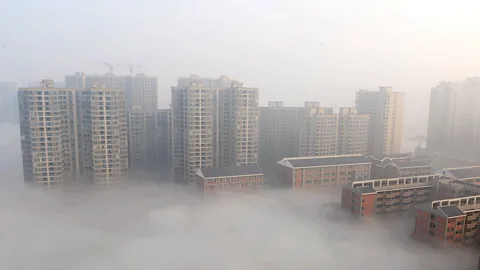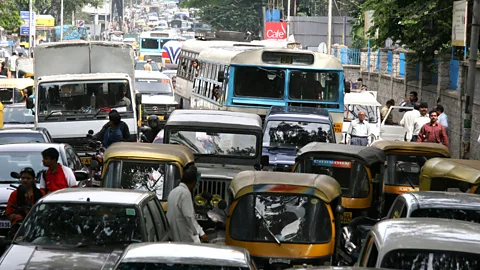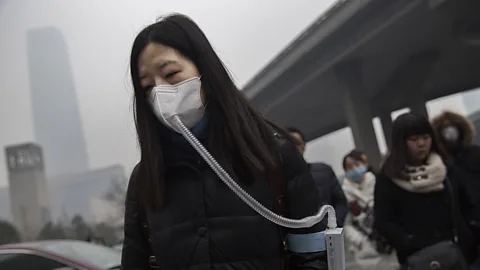The secretive world of 'danger pay'
 Getty Images
Getty ImagesYou've been offered a great job in a difficult location. Would extra 'danger money' tempt you to accept?
Deborah Manzoori left behind a career as a licensed insolvency practitioner last September to follow her husband, a chartered engineer who designs jet engines, on a two-year placement to India.
But when the 46-year-old Brit landed in Bangalore, India with her husband and 9-year old daughter, she realised that she wasn’t just giving up her job; as a trailing spouse she was also giving up some independence and, potentially, her sense of safety.
The family was advised by her husband’s company to hire a personal chauffeur as driving in Bangalore can be dangerous. “Driving is on the left, but in reality it's on the right, in the centre or anywhere in between and in any direction you please,” Manzoori explained. “In addition Westerners have been attacked at crash sites … and women, in particular, are vulnerable.”
Manzoori said not being able to pop out in the car at any time to go to the shops, the cinema or for any other reason can be frustrating. “We have to wait for the driver and… everything has to be planned in advance.”
 Alamy
AlamyShe said she has adjusted to her new lifestyle after seven months, “but I still don't like it”.
Many expats who relocate for work to the developing world are given hefty compensation packages to make up for lifestyle differences or difficulties — whether physical, psychological, or financial — that they may encounter during the course of their assignment abroad. Sometimes, a personal restriction is because of a societal sensitivity — particularly for women — in cultures where status is an important consideration, but equality may not be.
Companies often avoid terms such as “hardship allowance,” “danger pay” or “hazard pay” because of perceived negative connotations or legal ramifications. And some critics of the practice question whether putting a figure on danger and discomfort is advisable or even ethical. Yet experts say that to draw top talent to important but difficult or dangerous locales (think compensating for the threat of terrorism in Turkey or even smog in polluted cities such as Beijing), the practice is necessary.
 Alamy
AlamyThose who can stomach the potential challenges of a hardship posting often find that they can make up to 40% more money than for a similar job elsewhere, according to Mercer’s 2015 report on hardship assignments. That figure can be even higher in areas of extreme hardship. Mercer found that 73% of companies worldwide have no cap on the amount of money paid as a hardship allowance.
Employees relocating from Europe are the mostly likely to receive a hardship allowance with 90% of companies offering one in most cases, according to the study. Their counterparts in Latin America, meanwhile, are the least likely with just 50% of companies open to the idea.
“This is where a lot of business opportunities are increasing — they need to incentivise,” said Sebastian Reiche, an associate professor of managing people in organisations at the IESE Business School in Barcelona. These incentives, he added, tackle a variety of concerns and are unique to the conditions of each overseas placement.
What’s a hardship?
Not all danger or hardship allowances are labelled as such, but they aren’t hard to spot.
The Manzooris’ compensation package included help finding accommodation in a gated community, school fees to send their daughter to an international school, and the personal chauffeur. But there was no explicit mention of the gated community or chauffeur being part of a hardship package.
While some intergovernmental agencies and NGOs still use those terms — including the UN and USAID — many private companies simply don’t label the additional allowances as anything other than what they are.
 Alamy
Alamy“Global mobility managers may call it whatever they want,” Reiche said, “but it’s essentially a way to make it acceptable that you’ll have certain sacrifices as a part of your work or for you and your family.”
Factors that can lead to additional allowances for expats run the gamut from the economic (like regional instability, lack of public services and sanitation) to the geographical (like extreme weather, pollution and remoteness) or the cultural (like restricted personal freedom and religious tolerance).
Companies may similarly provide additional insurances (beyond health insurance) to address security threats, such as kidnappings, pandemics, terrorism or civil unrest. These may include a kidnap and ransom insurance, war risk insurance or an insurance to cover burglary and other household effects, depending on the particulars of the assignee’s destination.
Slagin Parakatil, who manages the quality of living reports for HR consulting firm Mercer, said the list of concerns is constantly changing.
“In a case like Brazil, where people are concerned by Zika virus, companies will most likely put some policies around that to repatriate women who are pregnant … but we haven’t seen any specific companies increase hardship allowance for this just yet,” he explained. “For the Ebola outbreak in West Africa there was definitely a decrease in the hardship and that affected our recommendations for allowances because it impacted the entire population.”
Getaways to get away
Allowances for hardship postings don’t just involve traditional on-the-ground incentives like cars and safe housing.
 Alamy
AlamyHuman resources consultant ECA International found in its report on the benefits for mobile employees that many assignees experiencing adverse living or working conditions – perhaps working in an isolated oil field or near a war zone – are likely to receive an allowance for additional leisure trips to pamper themselves in a less difficult location nearby.
“This type of trip is more common amongst employees in the oil & gas sector … in [countries like] Angola, Algeria, Pakistan, Iraq, Nigeria and India where around 40-50% of companies provide these trips,” explained ECA International marketing manager James Davis.
While the average is about one to two additional paid vacations per year, Davis said, it can be as high as a quarterly allowance.
Smog alert!
Coca-Cola is reported to offer something called an “environmental hardship allowance” for employees who relocate to China. That hazy label addresses an acute problem in many Chinese cities: smog.
A Coca-Cola spokeswoman was quoted by the Australian Financial Review in a July 2014 article as saying that the company’s “competitive mobility package includes an environmental allowance for postings to China” which the AFR report put at 15% on top an employee's base salary, without citing a source for the figure. The company declined to comment about the policy.
In March 2014 Panasonic, which employs about 70,000 people in China, became the first major company to announce a “lifestyle differential allowance” for expats that included coverage for air pollution.
 Getty Images
Getty Images“We’ve seen some companies in China that did a full increase in pay for the entire year, while others have done more temporary increases for periods when the smog is particularly bad,” said Parakatil of Mercer. Both the full-year increases and the temporary ones (typically allocated proportionally on a monthly basis) can be has high as 15% of an employees base salary, but many more companies simply pay for home installation of air and water purification systems, according to Parakatil. Most companies guard the particulars of such arrangements for fear of embarrassing the Chinese government.
Studies show that expats are increasingly concerned about the link between exposure to high levels of smog and respiratory illnesses like asthma, lung cancer and emphysema. A recent survey by the American Chamber of Commerce in Beijing found that nearly half of foreign companies operating in China report air quality concerns as driving senior executives away. Thus environmental hardship allowances have become a vital tool for global corporations to solve their problems recruiting and retaining talent in Chinese (and more recently, Indian) cities.
An ethical dilemma
Davis, though, questions enticing people to take risks by compensating them. ECA International doesn’t advise the use of “danger pay” or similar allowances.
“From an ethical point of view … there is the moral conflict incentivising staff to take dangerous assignments,” he said. “On the legal side of things, by explicitly paying ‘danger money’ you’re acknowledging that you’re [doing this].” That could prove problematic if someone decides to take legal action over an incident.
For many in-demand workers, however, the risks are only worth it if there are tangible rewards.
